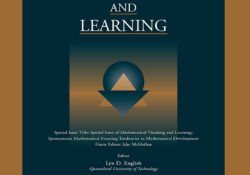eric.ed.gov har udgivet: The United States Agency for International Development (USAID) works in more than 50 developing countries to ensure that children have access to a quality education and the skills needed to be productive members of society. USAID invests in global education because they know that the positive effects of education are far-reaching – that it serves as a driver for all other development and for the reduction of extreme poverty. USAID’s education work focuses on improving the reading skills of children; strengthening youth workforce development and higher education; and expanding access to quality education in crisis and conflict environments. USAID partners to leverage resources and expertise, strengthen education systems and drive change so that children and youth can learn. The United States has historically championed efforts to improve… Continue Reading →
Like this:
Like Loading...
eric.ed.gov har udgivet: This report summarizes research conducted primarily over the past 10 years on how families’ involvement in children’s learning and development through activities at home and at school affects the literacy, mathematics, and social-emotional skills of children ages 3 to 8. A total of 95 studies of family involvement are reviewed. These include both descriptive, nonintervention studies of the actions families take at home and at school, and intervention studies of practices that guide families to conduct activities that strengthen young children’s literacy and math learning. The family involvement research studies are divided into four categories: (1) Learning activities at home, including those that parents engage in to promote their child’s literacy and/or math skills outside school; (2) Family involvement at school, including the actions and interactions that… Continue Reading →
Like this:
Like Loading...
tandfonline.com har udgivet en rapport under søgningen “Teacher Education Mathematics”: ABSTRACT ABSTRACT Spatial reasoning plays a vital role in choice of and success in science, technology, engineering, and mathematics (STEM) careers, yet the topic is scarce in grade school curricula. We conjecture that this absence may be due to limited knowledge of how spatial reasoning is discussed and engaged across STEM professions. This study aimed to address that gap by asking 19 professionals to comment on a video that documented children’s progression through 5 days of building and programming robots. Their written opinions on the skills relevant to their careers demonstrated by the children revealed that spatial thinking and design thinking are central to what they see. RÉSUMÉ Le raisonnement spatial joue un rôle essentiel dans la décision d’entreprendre une carrière… Continue Reading →
Like this:
Like Loading...
eric.ed.gov har udgivet: U.S. Federal and state education policies place considerable emphasis on assessing the effects that schools and teachers have on student test score performance. It is important for education policy makers to also consider other factors that can affect student achievement. This study finds that an exogenous school factor, discontinuous health insurance coverage, leads to a deficit in math achievement over time. A sample of Yuma County, Arizona public school students who experienced an illness or injury and whose health insurance coverage status was known were selected for inclusion into the study over five consecutive school years (1999-2003). The longitudinal math achievement trajectory of students who had private health insurance coverage was compared to students who had discontinuous coverage. Net of a student’s poverty status and other background… Continue Reading →
Like this:
Like Loading...
eric.ed.gov har udgivet: Children have a natural interest in math, and the "Teaching Math to Young Children" practice guide (ED544376) aims to help teachers capitalize on that interest to make children's preschool and school experience more engaging and beneficial. In this practice guide summary, readers will find: (1) An overview of the guide's five practical, evidence-based recommendations; (2) Examples of innovative tools and strategies teachers can use in their classrooms; and (3) A brief discussion of the evidence that supports the guide's recommendations. Link til kilde
Like this:
Like Loading...
eric.ed.gov har udgivet: Leveraging the use of mobile devices for education, such as instructional games, is an area of increasing interest for targeted subpopulations of students including those who are deaf/hard-of-hearing (DHH). This paper outlines the perspectives of Deaf Education teachers and DHH children who participated in the GeePerS*Math project. Interviews and surveys provide data from the primary implementation of the technology in an ecologically valid setting. Findings included similar results from both teachers and students with regard to attitudes and transfer of skills within the game to those in traditional curriculum. Unintended outcomes, such as gaining orienteering skills and peer-tutoring, were also noted. The results helped to inform the designers of educational technology with ways to relate with classroom instructors and children when creating advanced mobile applications. Link til… Continue Reading →
Like this:
Like Loading...
tandfonline.com har udgivet en rapport under søgningen “Teacher Education Mathematics”: ABSTRACT ABSTRACT In this study we investigated the effects of two naturalistic 2- to 4-year-old children’s intervention programs aimed at promoting children’s Spontaneous Focusing On Numerosity (SFON) and early numerical skills. The study consisted of a quasi-experimental, pretest-posttest design with a delayed posttest and an active control group participating in the Let’s Read and Talk program. All conditions had 6 weeks of intensive training followed by a 4-month rehearsal phase, when intervention activities were integrated into normal day care. The results of both numerical interventions in the whole group level show positive, small- to medium-sized long-term effects on cardinality-related skills from pretest to delayed posttest. The SFON tendency increased more from pretest to posttest in both studies but the group differences… Continue Reading →
Like this:
Like Loading...

